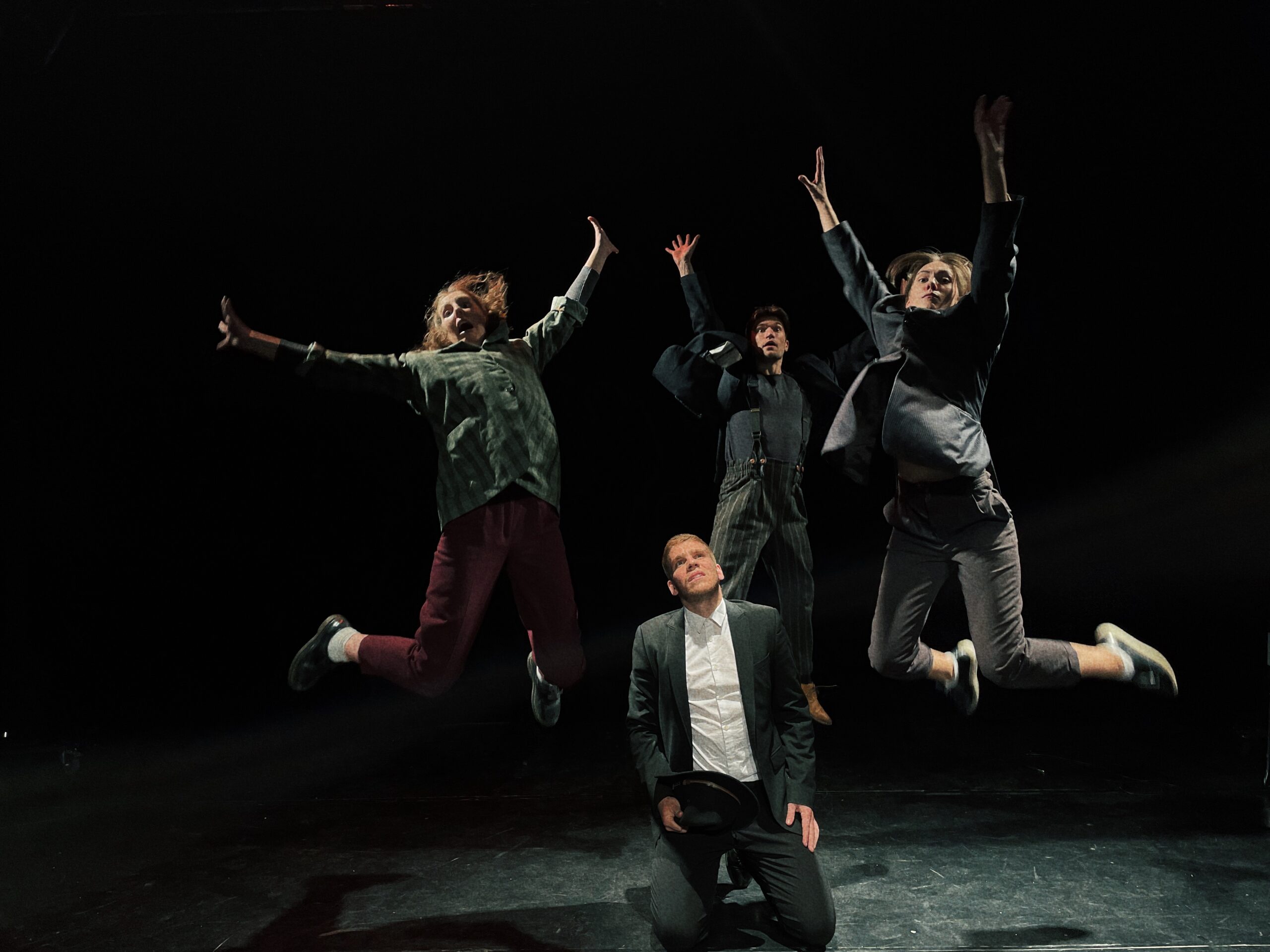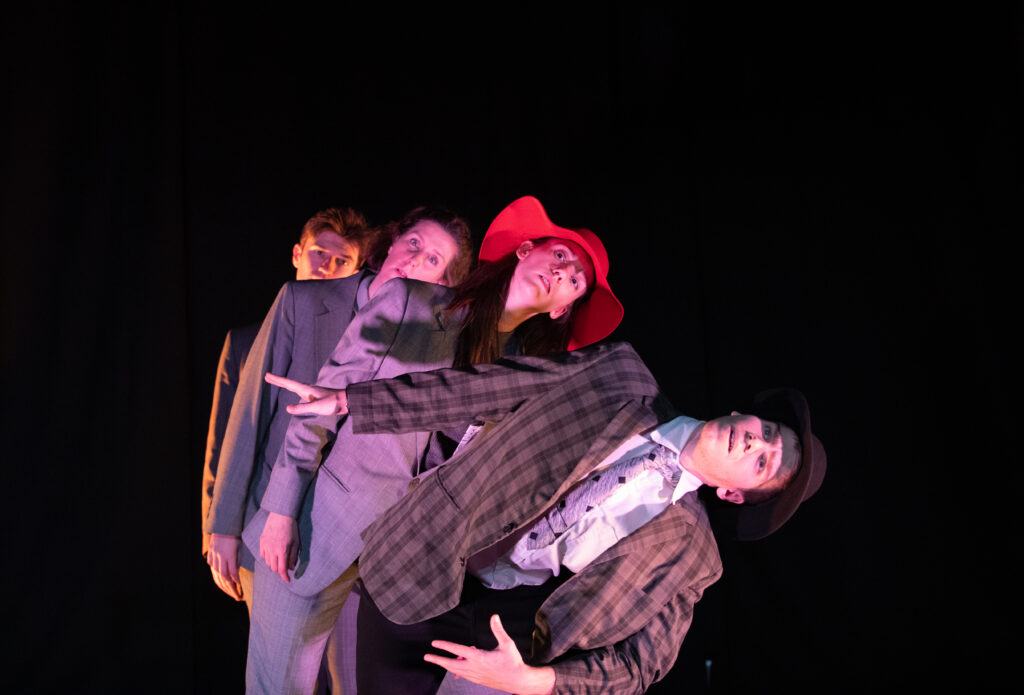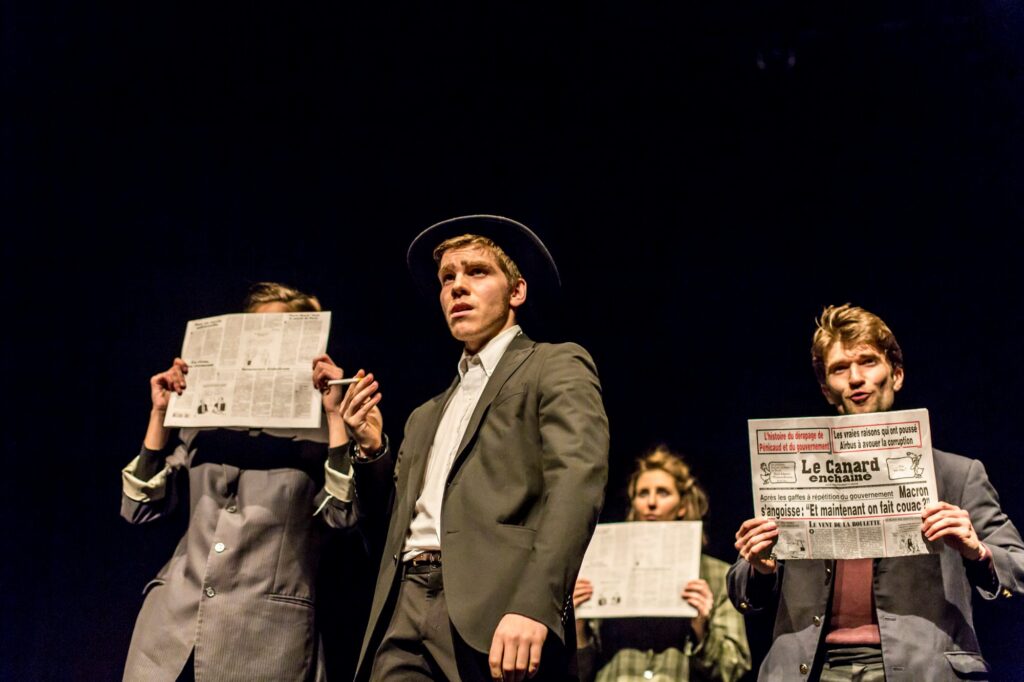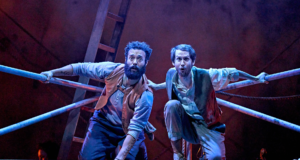Voloz Collective’s Olivia Zerphy on The Man Who Thought He Knew Too Much
Earlier this year, Voloz Collective brought The Man Who Thought He Knew Too Much to Clapham’s Omnibus Theatre. We called it ‘a brilliant whirlwind of story and movement‘, giving it a full 5 stars. After a successful run at Edinburgh Fringe, Voloz are coming back to London for a short run as part of Pleasance’s Best of Edinburgh season. It seemed like a good time to catch up with Co-Artistic Director and Performer Olivia Zerphy to find out a bit more.
Congratulations on the success of The Man Who Thought He Knew Too Much at Ed Fringe. You’re coming back to London as part of the Pleasance Best of Ed Fringe. Tell us about the show and what audiences can expect?
Thank you! The Man Who Thought He Knew Too Much is a fast-paced, comedic, cinematic, acrobatic whodunnit. It follows the story of Roger Clement, a copywriter in 1960’s New York. One day, following a series of seemingly unrelated minor delays, Roger is just a few minutes late to work, arriving just in time to witness the explosion that kills his friends and colleagues. This event draws him into a web involving cold war conspiracy theories, false identities, hilarious mis-steps, and an ever present mysterious figure in a red hat. Audiences should expect plot twists, live music, back flips, and lots of laughs in this high-octane, roller coaster of a show.
Voloz Collective is an international company, where are you talking to us from today? While many more people have been working remotely since the beginning of the pandemic, we can only imagine how creating physical theatre from different locations presents its own set of challenges?
I (Olivia) am currently in Vermont, USA. Paul is just outside of Paris, and Emily and Sam are both in London. You are absolutely right – creating physical theatre from different locations presents its own set of challenges. In this case, unequivocally insurmountable ones. After a few hilarious and entirely unsuccessful attempts at zoom rehearsals, we discovered that since our style is so dependent on the relationship between our four bodies in space, there is absolutely no way to create without having, well, our four bodies in one space.
There are certain things we can accomplish remotely, and we do our best to frontload production, marketing and administrative work so that when we are together in the same country we can focus on creating our shows.
In Voloz Collective, very differently from traditional theatre companies, you share all of the roles directing, acting, producing etc. How do you make this work?
While the four of us have different backgrounds, and certain categorizations of actor / director, social media marketer etc… that we might fall into outside of our work with Voloz. Within the company, we strive to resist the hyper-specialisation that is increasingly expected in many professions. That doesn’t mean we sit down and collaboratively compose every email or discuss until we come to a consensus on every line of a budget spreadsheet, (we divy tasks up in weekly zoom production meetings) – but it does mean that each of us has a finger on the pulse of the company, and each of us feel ownership of and responsibility to what we’re creating.
People often think that we must be extremely aligned in terms of taste and vision in order to create shows in this way, but that’s actually not the case. While we all have a shared language from our Lecoq training, we have very different theatrical universes, and there is a constant push and pull between the four of us. We always have different perspectives of what the work is or could be. While certainly not as efficient as having one director in charge of final creative decisions, we think this internal friction is productive – that it makes the work more alive, nuanced, and surprising.
Your Ed Fringe run saw a sold out run and some really great reviews, you must be pretty pleased with how it went?
This was our first time at the Fringe, and there were a lot of uncertainties regarding audience behaviour due to covid concerns. Bringing our show to the Fringe was a risk, and we are incredibly pleased with the payoffs. The main thing we took away from the past month was a deep respect and admiration for the sheer talent and resiliency of the global artistic community.


Prior to Ed Fringe, you ran a successful crowdfunding campaign, where you even shared some figures with the worst case suggesting a loss of up to £14,000. We know that so many performers faced such financial challenges at Ed Fringe, how did it all go for you?
Thank you for asking this. We are really passionate about being transparent regarding the financial realities of producing as a young theatre company. We were extremely fortunate in many ways. We were able to raise £4,156 in our crowdfunding campaign, received £1,000 from the Carol Tambour Incentive Award, £1,000 from the LET/Greenwich Partnership Award, and received £400 from the Pleasance Debut Fund. In addition to this unbelievable support, we sold out every performance in our 75 seat venue. Our time at the Fringe was as successful as it possibly could have been. Even so, we will barely break even.
Many companies – through absolutely no fault of their own – did not have access to this kind of financial support, and didn’t see ticket sales reflect the immense quality of their work. They will be operating at an enormous loss post-Fringe. Even more unsettling is the fact that the massive financial risk coupled with the need for sizable upfront funds made bringing work to the Fringe simply not possible for many companies. Voloz was very fortunate to be in a position that allowed us to take a financial risk. We were able to dedicate a huge amount of time and energy to raising funds in the lead-up to the Fringe- this is not the case for many, many companies, which is in no way reflective of the quality of their work, and entirely reflective of the far reaching influence of luck, privilege and circumstance.
Like all inequities, this disproportionately affects artists of colour, artists that identify as D/deaf or disabled, artists who identify as working class, and artists identifying as a member of any group historically underrepresented in the theatre industry.
This year, there were some fantastic initiatives working to address this problem, but there needs to be more. While the Fringe is just one aspect of a larger industry, it is a place that unites artists, audiences, critics, programmers, and producers from around the world. Being shut out of the opportunity to have work seen by these industry professionals has consequences that reach far beyond the month of August.
What did you see at EdFringe yourselves?
We saw so many stunning shows. A few of our favourites were See You from Hung Dance, Famous Puppet Death Scenes from Old Trout Puppet Workshop, Project Dictator from Rhum and Clay and Hungry from Paines Plough.
What’s next for Voloz Collective? Is there more life for The Man Who Thought He Knew Too Much or do you have any new projects in the pipeline?
After our run at the Pleasance this October, we will begin creation of our next piece, which will premiere in April of 2023. In May of 2023, we have a month-long run of The Man Who Thought He Knew Too Much in Paris, where we will perform it in French! Because of interest generated during our time at the fringe, we are also in the process of scheduling another mini-tour of The Man Who for next spring.
You describe the Man Who as ‘Wes Anderson meets Hitchcock meets Spaghetti Western’ – as a final fun bonus question and without giving it too much thought, give us your top five movies
Sorry To Bother You, Everything Everywhere All At Once, Parasite, Fantastic Mr. Fox and Baby Driver
Huge thanks to Olivia for taking time to talk with us. The Man Who Thought He Knew Too Much plays at The Pleasance from 4 to 7 October. Further information and bookings click here
 Everything Theatre Reviews, interviews and news for theatre lovers, London and beyond
Everything Theatre Reviews, interviews and news for theatre lovers, London and beyond





